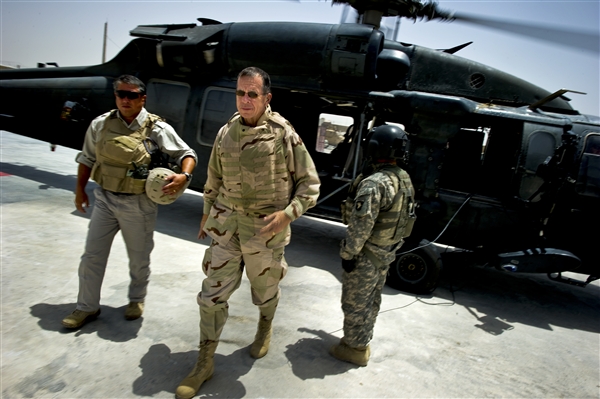PETERSON AIR FORCE BASE, Colo., June 1, 2010 — Confident in the strength of the U.S.-Canada security relationship, the new commander of North American Aerospace Defense Command and U.S. Northern Command said he’s turning his focus southward.
“The Number 1 priority is going to be our partnership with Mexico. There is just no question,” Navy Adm. James A. Winnefeld Jr. told reporters here last week. Winnefeld is touring the southwestern U.S. border region today, accepting the invitation extended by Arizona Sen. John McCain during Winnefeld’s April confirmation hearing. It’s Winnefeld’s first visit there since assuming command on May 19, and he told reporters he’s looking forward to getting a deeper understanding of the issues involved. Although detailed plans are still being worked, the up to 1,200 National Guard troops expected to deploy to the U.S.-Mexican border as part of President Barack Obama’s border-security initiative aren’t expected to report to Winnefeld. The Guard members will serve under Title 32 authority, paid for with federal funds but under their state governors’ authority.
However, Winnefeld sees himself as instrumental in helping to ensure the Mexicans understand what their role will be – and more importantly, what it won’t be.
“This is not militarizing the border. There is no intent to do that,” the admiral said. “This is a civil support mission that is a bridge until some of the $500 million that the president has identified to plus up the [federal law enforcement capability along the border] gets into place.”
Winnefeld recognizes the importance of perception. “We have to make sure it is shaped appropriately so we don’t achieve a tactical victory and end up with a strategic loss, particularly with our partners in Mexico,” he said.
Obama’s plan ensures these and other issues are addressed, he said, and recognizes that both countries have a stake in controlling cross-border trafficking.
“We are looking at stuff going south” – primarily cash and weapons – “as much as we are looking at stuff going north” – narcotics and other illicit materials, Winnefeld said. “And that is important to our partners.”
He emphasized the importance of the U.S.-Mexico partnership and the role Northcom can play.
Working in cooperation with U.S. Southern Command, Winnefeld sees “tremendous opportunity” to build closer ties between the U.S. and Mexican militaries in ways that both countries find acceptable.
“The military-to-military relationship with Mexico we have has never been better,” Winnefeld said. He credited efforts made by Navy Adm. Mike Mullen, the chairman of the Joint Chiefs of Staff, and Air Force Gen. Victor “Eugene” Renuart, Winnefeld’s predecessor at Northcom.
It’s an equal partnership built on full respect for Mexico’s sovereignty, he said.
The relationship-building also recognizes that addressing these challenges does not require U.S. boots on the ground, Winnefeld said, at least in the operational sense.
“We are just not interested in doing that and the Mexicans are not interested in having us [to] do that,” he said. “But, there is a tremendous amount of opportunity in between that” to share training, information and intelligence and to help the Mexican military build capacity and capability.”
Winnefeld emphasized during his confirmation hearing the importance of both Northcom’s and NORAD’s relationships, particularly with Canada and Mexico. “I’ve observed that there are no other combatant commands where support for their partners [is] more important than these two,” he told the Senate panel.
NORAD, which celebrated its 52nd anniversary this year, stands as a testament to the enduring U.S.-Canadian defense relationship, Winnefeld told reporters.
Winnefeld expressed concern during his confirmation hearing that drug-dealing and other criminal cartels threaten U.S. national security as well as the Mexican government. He praised Mexican President Felipe Calderon’s leadership and courage in confronting these challenges.
During his visit here last week, Mullen emphasized the importance of strengthening the relationship between the United States and Mexico.
“We’re looking for ways to assist them and support them where they ask us to support them,” he said at a town hall session. “I also think there are wonderful opportunities to strengthen the relationship between our countries and between our militaries.”
It all boils down to trust, Mullen said, and the ability to see issues from another country’s perspective.
“It is critical that you try to see it from their perspective,” he said. “They are a neighbor. They are a good friend. And we want to do as much as we can to support them.”
Source:
U.S. Department of Defense
Office of the Assistant Secretary of Defense (Public Affairs)

 von
von 